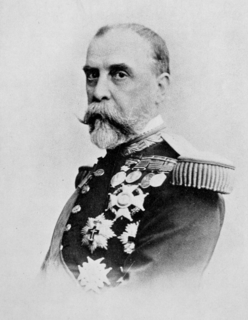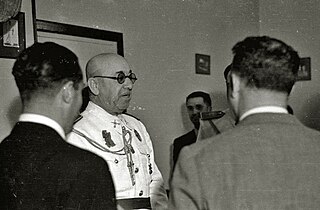 W
WFelipe Alfau Mendoza was a Spanish military officer. He served as the first Spanish High Commissioner in Morocco and as Captain-General of Catalonia.
 W
WRamón Blanco Erenas Riera y Polo, 1st Marquess of Peña Plata was a Spanish brigadier and colonial administrator. Born in San Sebastián, he was sent to the Caribbean in 1858 and governed Cuba and Santo Domingo. In 1861, he returned to Spain but was then sent to the Philippines (1866–1871).
 W
WDon Pedro Caro y Sureda, 3rd Marquis of la Romana was a Spanish general of the Peninsular War.
 W
WJoaquín Ibáñez Cuevas y de Valonga, Baron de Eroles led a Spanish division against Imperial France in a number of actions during the Peninsular War. A lawyer at the outbreak of war, he took command of guerillas who resisted the French occupation of his native Catalonia. He fought at Molins de Rey in 1808. Captured by the French at Gerona in 1809, he later escaped. By 1810 he led one of four regular divisions of the Army of Catalonia. In November 1810 he destroyed a French convoy at La Junquera. His men were driven off Montserrat Mountain on 25 July 1811. His division wiped out a French column at Col de Balaguer on 18 January 1812. Six days later he was badly beaten at Altafulla when he mistakenly attacked Maurice Mathieu's superior French force in a thick fog. On 5 March he defeated a French force that attacked him at Roda de Isábena. Later in the war he liberated a number of towns from the French.
 W
WJosé Manuel de Ezpeleta y Galdeano, 1st Count of Ezpeleta de Beire (1739–1823) was a Spanish military officer and politician, governor of Cuba from 1785 to 1789, and viceroy of New Granada from 1789 to 1797.
 W
WDon Fernando Fernández de Córdova y Valcárcel, 2nd Marquess of Mendigorría, was a Spanish military, politician, and Prime minister of Spain for one day.
 W
WJaime de Guzmán y Spinola, II Marquis of la Mina (1690–1767) was a Spanish Army commander and Captain General of Catalonia. He was also the Fifth Count of Pezuela de las Torres, near Alcalá de Henares.
 W
WAlfredo Kindelán y Duany, 1st Marquess of Kindelán was a Spanish general and politician. A close ally of Francisco Franco before and during the Spanish Civil War, their relationship would later become strained as Kindelán emerged as a leading advocate for a swift restoration of the monarchy. He belonged to the Kindelán family, a noted Spanish family of Irish origin.
 W
WBrigadier-General Luis Roberto de Lacy, 11 January 1775 – 5 July 1817, was a Spanish professional soldier of Irish descent, who served in the Spanish and French Imperial armies.
 W
WFrancisco Llano de la Encomienda (1879–1963) was a Spanish soldier who served in Africa and was promoted to General in 1931. During the Spanish Civil War (1936–39) he remained loyal to the Second Spanish Republic. He was in command of the troops in Barcelona when a military revolt was attempted on 19 July 1936. He was imprisoned by the rebels, and after the revolt was relieved of his command. He was given command of the Army of the North in November 1936 but was not able to form a unified command. He was handicapped by regional jealousies and a mixed command of regular troops and militia. He was dismissed in May 1937 shortly before the north of Spain fell to the insurgents. He took refuge in Mexico after the war.
 W
WJosé López Domínguez,, was a Spanish military and politician who served as Prime Minister of Spain between 6 July and 30 November 1906.
 W
WJuan Manuel Fernández Pacheco y Zúñiga, Duke of Escalona and Marquess of Villena, was a Spanish aristocrat, politician, and academician who founded the Royal Spanish Academy.
 W
WArsenio Martínez-Campos y Antón, born Martínez y Campos, was a Spanish officer who rose against the First Spanish Republic in a military revolution in 1874 and restored Spain's Bourbon dynasty. Later, he became Captain-General of Cuba. The soldier and politician took part in wars in Africa, Mexico and Cuba and in the Third Carlist War.
 W
WJoaquín León Milans del Bosch y Carrió was a Spanish military officer. The change in ideological orientation of the Milans del Bosch family was completed with his generation; traditionally, they had been liberal military officers, but during the twentieth century they aligned themselves with reactionary forces.
 W
WJosé Moscardó e Ituarte, 1st Count of the Alcázar of Toledo, Grandee of Spain was the military Governor of Toledo Province during the Spanish Civil War. He sided with the Nationalist army fighting the Republican government and his most notable action was the defence and holding of the Alcázar of Toledo against Republican forces.
 W
WJosé Olaguer Feliú y Ramírez was a Spanish lieutenant general, Minister of War and politician.
 W
WMiguel Primo de Rivera y Orbaneja, 2nd Marquess of Estella, 22nd Count of Sobremonte, was a dictator, aristocrat, and military officer who served as Prime Minister of Spain from 1923 to 1930 during Spain's Restoration era. He deeply believed that it was the politicians who had ruined Spain and that governing without them he could restore the nation. His slogan was "Country, Religion, Monarchy." Historians depict him as an inept dictator who lacked clear ideas and political acumen, and who alienated his potential supporters such as the army. He did not create a base of support among the voters, and depended instead on elite elements. His actions discredited the king and ruined the monarchy, while heightening social tensions that led in 1936 to a full-scale Spanish Civil War.
 W
WJorge Próspero de Verboom, 1st Marquess of Verboom, was a Flemish-born military engineer in the service of the King of Spain. On 9 January 1727, King Philip V granted him the title of Marquess of Verboom.